- Sailing >
- Sailing Equipment and Gear >
- Rudder blade
Rudder blades
{{product.productLabel}} {{product.model}}
{{#if product.featureValues}}{{product.productPrice.formattedPrice}} {{#if product.productPrice.priceType === "PRICE_RANGE" }} - {{product.productPrice.formattedPriceMax}} {{/if}}
{{#each product.specData:i}}
{{name}}: {{value}}
{{#i!=(product.specData.length-1)}}
{{/end}}
{{/each}}
{{{product.idpText}}}
{{product.productLabel}} {{product.model}}
{{#if product.featureValues}}{{product.productPrice.formattedPrice}} {{#if product.productPrice.priceType === "PRICE_RANGE" }} - {{product.productPrice.formattedPriceMax}} {{/if}}
{{#each product.specData:i}}
{{name}}: {{value}}
{{#i!=(product.specData.length-1)}}
{{/end}}
{{/each}}
{{{product.idpText}}}

... built according to the new class rules. Class rules have standardized Optimist daggerboard and rudder: size, shape, epoxy, foam and fiberglass. Both Optimist rudder and daggerboard are made to the maximum ...
Optiparts - Windesign

Shaft diameter: 40, 50 mm
Blade height: 772 mm - 1,120 mm
Blade width: 260 mm - 400 mm
... adequately profile the appendices. Our rudders are the result of special hydrodynamic experiences aimed at obtaining a correct sizing and profiling of the blade to reduce resistance, suction and cavitation. The ...

Shaft diameter: 40 mm - 80 mm
Blade height: 1,014 mm - 1,625 mm
Blade width: 300 mm - 550 mm
... adequately profile the appendices. Our rudders are the result of special hydrodynamic experiences aimed at obtaining a correct sizing and profiling of the blade to reduce resistance, suction and cavitation. The ...

... attachment: - rudder with rudder carrier bearing, - spade rudder. Types of rudder according to ratio of the areas in front of and behind the axle: - unbalanced ...
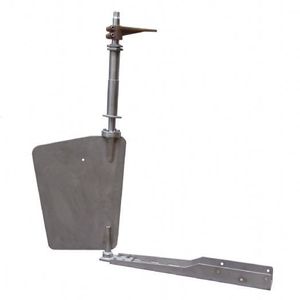
Standard equipment Rudders system consists of the following components: - rudder blade with shaft and flange, - rudder carrier bearing with housing, - support for ...

... equipment Rudders system consists of the following components: - rudder blade with shaft and flange, - rudder axle with flange - stern tube with bearings and stuffing. ...

... design techniques including CFD to determine the accurate flow into the rudder from working propeller. Detailed hydrodynamic loading is calculated to assess rudder stock and blade strength ...

Shaft diameter: 42, 54, 40, 80 mm
Blade height: 345, 440, 415, 510, 560 mm
Blade width: 220, 200, 205, 235, 260 mm
... get the best result from a given rudder surface and from the applied torque, one must study the rudder shape both in perspective and in section. Our standard production, which includes a wide complete ...
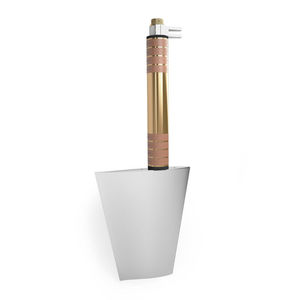
... manufacture and supply rudders by taking care of all these factors to give the customer the needed performance. Several types of rudders can be made like fish tail, spade rudder, ...

Complete school rudder system for Laser. Rudder head + Plywood rudder blade + axle. Only for leisure or school use,
NENUPHAR

... building rudders for customers who demand the best. The engineering, materials and construction methods that are used at GMT to build every rudder are unsurpassed. Many American syndicates in the last ...

We have built a couple of new International 6M rudder to modern designs by Ian Howlett, with carbon fiber skins over foam cores. We've done these with both steel and carbon fiber posts. We also have our own design on ...
Competition Composites Inc

Compensated rudders adjusted to the dimensions of the propeller clearence of each boat, with rudder blade shaped or flat, with three different rudder hole systems for ...
TALLERES BLANCHADELL, S.L.
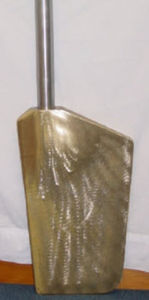
... The depth of the blade The width of the blade (at widest point) The diameter and length of the rudder stock (out of blade) If a pintle and shoe is required Tiller ...
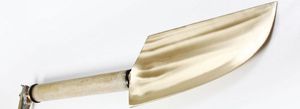
... to provide rudder assemblies for the following types of rudder: Pintle mounted rudders Hung rudders Split assembly rudders Transom hung ...

We offer different features and systems, depending on design and type of boat vessel. We offer: Keel-based steering system for one engine vessels. Suspended type steering system for single or double engine vessels. Flanged steering ...

Propeller shaft line is used to transmit the engine power to propeller thrust. Each vessel has its unique propulsion shaftline System, the typical parts include thrust shaft, intermediate/stern shafts, bearings, couplings and seals. Propeller ...
Your suggestions for improvement:

The rudder blade is the flat part of the rudder assembly which pivots to direct the water flow created by the vessel's forward movement, thus changing the boat's direction.
ApplicationsAll sailboats, as well as motor vessels driven by a shafted propeller or another non-directional system, must be steered via a rudder. Double rudders are not uncommon, especially on twin-engined craft. Such an arrangement makes monohull sailboats more maneuverable when heeled over.
TechnologiesThe rudder consists of a blade of varying shape, usually thin and hydrodynamic, and the stock, which fits into the rudder stock tube incorporated into the boat's hull. Naval architects calculate rudder blade dimensions based on vessel length, weight and, especially, top speed.
Sailboat rudders reach deeper into the water than those mounted on powerboats. Wood, metal alloys and fiberglass- or carbon-based composites are used to make the blades. The rudder can be attached directly to a tiller or linked to a stock arm, a quadrant, a rack or another steering system.
Choice will depend on vessel type and the parameters mentioned above, including top speed and weight. Stock tube diameter and the type of steering system are additional factors. For a production model sailboat, the make and model will determine choice.
the best suppliers
Subscribe to our newsletter
Receive regular updates on this section.
Please refer to our Privacy Policy for details on how NauticExpo processes your personal data.
- Brand list
- Manufacturer account
- Buyer account
- Our services
- Newsletter subscription
- About VirtualExpo Group













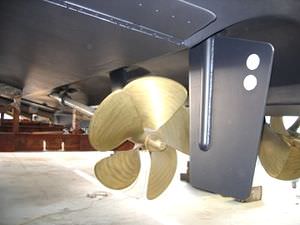




Please specify:
Help us improve:
remaining